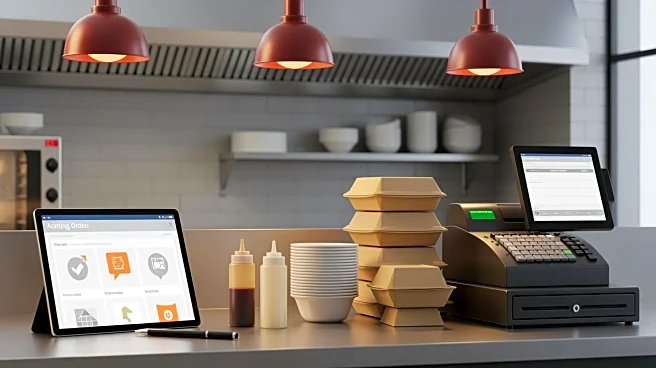What's Happening?
The rise of meal-delivery apps such as DoorDash, Uber Eats, and Grubhub has significantly altered the restaurant industry in the United States. These platforms have shifted the focus from traditional dining experiences to convenience-driven food delivery,
leading to changes in restaurant operations and customer interactions. According to Ellen Cushing, nearly three out of every four restaurant orders are now consumed outside the restaurant, resulting in half-empty dining rooms and chefs designing dishes that can withstand delivery. This shift, described as 'convenience maximalism' by Derek Thompson, has been fueled by substantial venture capital investments, reshaping consumer expectations and placing strain on workers, small businesses, and communities.
Why It's Important?
The transformation of the restaurant industry due to delivery platforms has broader implications for U.S. society and economy. While these services offer convenience to consumers, they also challenge traditional restaurant business models, potentially leading to reduced employment opportunities and altered community dynamics. The focus on speed and convenience over connection and service may erode the cultural significance of dining out. Additionally, the strain on workers and small businesses raises ethical concerns about labor practices and the sustainability of local economies. As the industry adapts, stakeholders must consider the balance between technological advancement and preserving the integrity of restaurant culture.
What's Next?
As the restaurant industry continues to evolve, stakeholders may need to address the challenges posed by delivery platforms. This could involve regulatory measures to ensure fair labor practices and support for small businesses affected by the shift. Restaurants might explore innovative strategies to enhance in-person dining experiences and differentiate themselves from delivery-focused competitors. The ongoing adaptation to consumer preferences and technological advancements will likely shape the future landscape of the industry, with potential implications for employment, community engagement, and cultural practices.
Beyond the Headlines
The rise of delivery platforms highlights ethical and cultural dimensions, such as the impact on workers' rights and the erosion of traditional dining experiences. The focus on convenience raises questions about the long-term sustainability of this business model and its effects on community cohesion. As consumers increasingly prioritize speed and ease, the cultural significance of shared meals and hospitality may diminish, prompting discussions about the value of preserving these traditions.

















